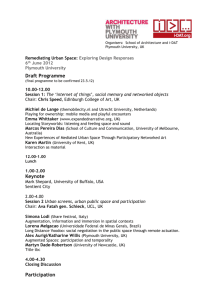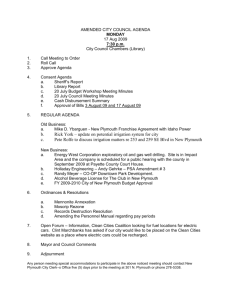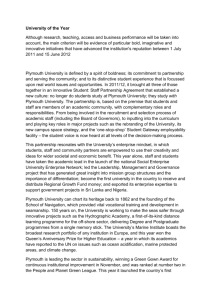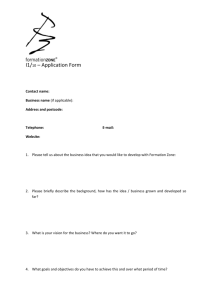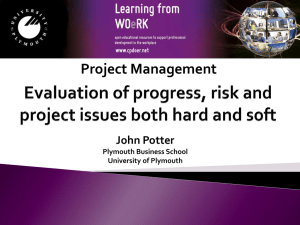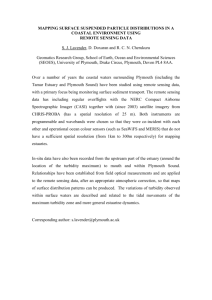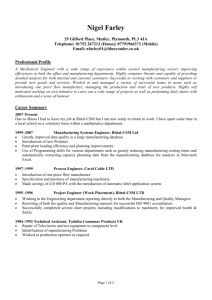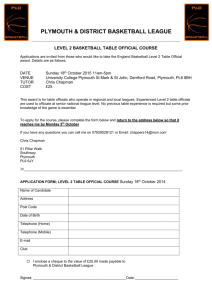Transcript for University of Plymouth
advertisement
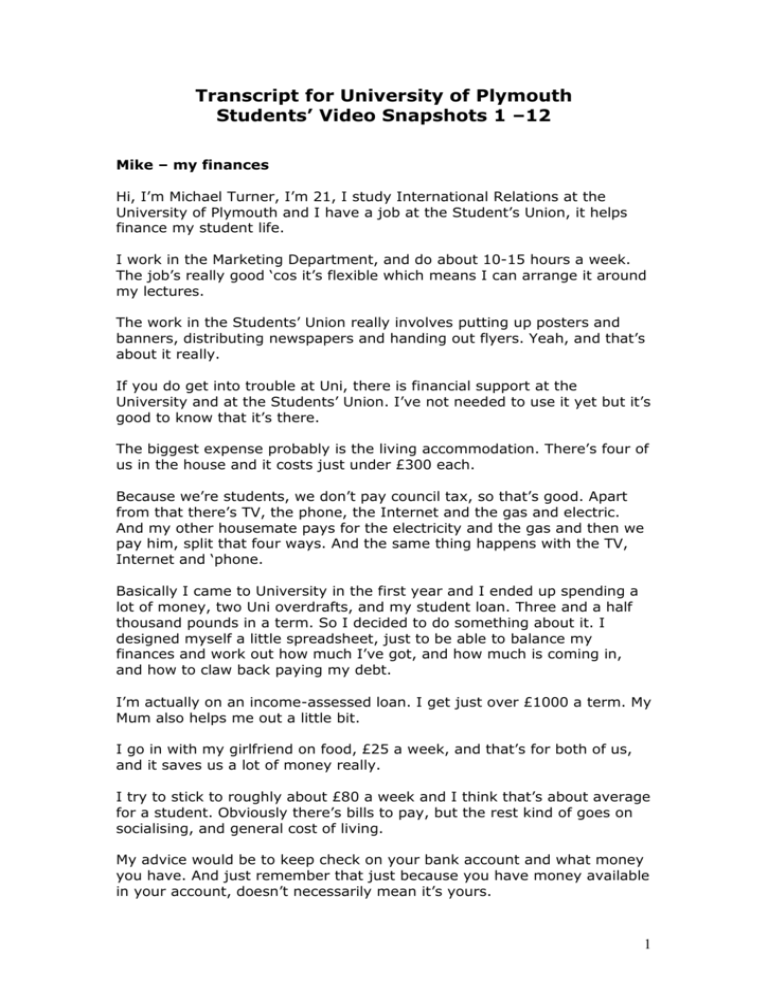
Transcript for University of Plymouth Students’ Video Snapshots 1 –12 Mike – my finances Hi, I’m Michael Turner, I’m 21, I study International Relations at the University of Plymouth and I have a job at the Student’s Union, it helps finance my student life. I work in the Marketing Department, and do about 10-15 hours a week. The job’s really good ‘cos it’s flexible which means I can arrange it around my lectures. The work in the Students’ Union really involves putting up posters and banners, distributing newspapers and handing out flyers. Yeah, and that’s about it really. If you do get into trouble at Uni, there is financial support at the University and at the Students’ Union. I’ve not needed to use it yet but it’s good to know that it’s there. The biggest expense probably is the living accommodation. There’s four of us in the house and it costs just under £300 each. Because we’re students, we don’t pay council tax, so that’s good. Apart from that there’s TV, the phone, the Internet and the gas and electric. And my other housemate pays for the electricity and the gas and then we pay him, split that four ways. And the same thing happens with the TV, Internet and ‘phone. Basically I came to University in the first year and I ended up spending a lot of money, two Uni overdrafts, and my student loan. Three and a half thousand pounds in a term. So I decided to do something about it. I designed myself a little spreadsheet, just to be able to balance my finances and work out how much I’ve got, and how much is coming in, and how to claw back paying my debt. I’m actually on an income-assessed loan. I get just over £1000 a term. My Mum also helps me out a little bit. I go in with my girlfriend on food, £25 a week, and that’s for both of us, and it saves us a lot of money really. I try to stick to roughly about £80 a week and I think that’s about average for a student. Obviously there’s bills to pay, but the rest kind of goes on socialising, and general cost of living. My advice would be to keep check on your bank account and what money you have. And just remember that just because you have money available in your account, doesn’t necessarily mean it’s yours. 1 Annie – my social life Hi, I’m Annie, I’m 19. I’m a first year studying Geography at Plymouth University and I’m a member of what I think is the best society, Plymouth University Riding Club. If you’ve ever had the chance to ride before but never been able to afford it, this is a really good opportunity, lessons are £13 for an hour, as opposed to £30. You wouldn’t normally get to ride these kind of horses for £13, and if you haven’t got the gear then it’s only 50p to hire a hat. Plymouth University Riding Club has three BUSA teams, British University Sports Association, and three friendly teams, all of which go to other Universities and compete in dressage and show jumping. The friendly teams are just for fun and the BUSA, it’s quite a serious competitive thing. We’ve made the finals three years in a row now, which is a great achievement and we’re really proud of it. Whether you’re an experienced rider or a novice rider who likes to compete, the Riding Club offers everything. We’ve got a real mix of people, 50-60, it’s not a stuck-up club, you don’t have to have your own horse and we’ve also had more boys joining this year, so it’s not just a girl club. One thing about riding here is getting to the stables, but we all have cars, which we all share the cost of petrol, so it’s not a huge problem. For me, it really improved self-confidence, it's a great form of exercise and at the Uni club, we also offer beach rides and hacks. In Devon we’ve got countryside on our doorstep so it’s a great way to enjoy it and just unwind, and it’s a really exhilarating sport. The Roundabout Club is situated just off campus. It’s a favourite student hangout and we’re lucky enough to receive sponsorship for them. We hold weekly committee meetings here at the Roundabout. The Riding Club’s definitely not just about riding horses. We have a really active social life, we have fortnightly socials, we dress up, everyone gets really involved, it’s a really good laugh, you know, it’s just a way to unwind from Uni life. So if you fancy a laugh then come and join us at the Riding Club 2 Sana – my student halls of residence Hey everyone, my name’s Sana, I’m 21 years old and I’m a medic here at Plymouth. I live in Halls, I’m an assistant warden here and I love it. So this is where I live. So this is our kitchen, really where we hang out and just like home really. It’s where we cook, spend most of our evenings, we don’t really have a lounge here, so it’s where we hang out, eat, cook for each other, Christmas dinners. Only downside is we don’t have our mums to do the washing up for us. So this is the bedroom. This is where I spend, well, quite a lot of my time during the day. Of course you’ve got your bed and then all your shelving area, more than enough space for all my books, of course as a medical student, and I love to read, need to have all my books. This is really quiet and the wardens make sure it stays quiet when I’m studying and during exam periods and things. Internet is free, which is a great advantage, because I can just sit and check email whenever I want, middle of the night, or first thing in the morning. Only thing I have to pay for is the TV licence. More than enough wardrobe space for all my shoes and clothes, which helps, really helps. The best thing about my bedroom though is of course my en suite. Perfect for one person, nothing more you really need. Just a little tour of my room. It’s great when you’re in your first year ‘cos you’re all in the same boat, you’re all scared so you make friends instantly. Howard, are you ready? Cleaning isn’t really a problem, I mean we’ve got domestics coming in twice weekly to do our kitchens and corridors. For our individual rooms of course given a vacuum cleaner and a mop bucket, they’re our responsibility. We don’t want to make the cleaner angry though, get fines. So washing up we do ourselves. One of the best things of living in Halls is our Student Village Reception. They deal with everything from broken lights to bullying. Looks like today I’ve got my parcel. Only across from where I live it takes me less than a minute to get here. Of course one of the best things about Plymouth University is how the Halls are right in the city centre. Shopping is two minutes down the road, bus station, train station, anything you really want is within two minutes distance. My lectures, all I have to do is cross the road, I love living here, it’s a perfect mix of support and independence you really need when you first leave your parents. If I could, I’d live here all my life. 3 Lucy – my career Hi, my name’s Lucy, I’m 20, I’ve just finished my final year studying Geography at the University of Plymouth. I decided on my career which is the next big step, I want to go into environmental consultancy, hopefully with a large firm. Recently the University put on a Careers Fair, which is really useful. I found a couple of companies I'm interested in so I booked an appointment with the Careers Office to get some advice. At Plymouth the Careers Office supports you throughout your time at Uni and three years after you graduate. I think it’s going to be quite difficult to find a job I love so I’m going to make the most of all the help I can get while I’m here. Hi, I’ve got an appointment with Glenn Crust. Woman Of course, I’ll just go and get him for you, if you’d like to take a seat. Lucy Thanks. Hi. Glenn Hi Lucy, I’m Glenn, I think I met you in second and third year modules. Lucy Nice to meet you …yes. Glenn Come through. So one of the things we want to look is your CV. Lucy Yes please. Glenn OK. What have you done with it so far? When was the last time you looked at it? Lucy Third year module. Glenn The highlight here for me is the qualification rather than the institution. What kind of jobs are you applying for? 4 Lucy Environmental consultancy, either with environmental firms or engineering firms. Glenn Think about who the employers are that you want to approach, how you’re going to approach them on paper, application forms, CVs and then, when you get invited to interview, how you can improve your performance so that you attract some job offers. Lucy My course was actually really helpful. It included two modules, one on employability and one on careers. Now that I’ve finished, I realise how useful the University Careers Office is. I picked up some really useful hints and tips today which should give me a head start in finding a job. I don’t think it’s quite hit me yet, going out into the real world, but I’m far more prepared than I thought I was. I’ve loved being a student at Plymouth University but I know that I can’t stay a student forever, so I’m looking forward to facing new challenges, and at last making some money of my own. Steve – my social life Hi, my name’s Steve, I’m 19, I’m a Biology and Coastal Ecology student, I’m also Chair of the Fairtrade Society. The Fairtrade Society is just about promoting Fairtrade goods and because we’re a Fairtrade University, we like to promote Fairtrade alternatives, for everything we’ve got in our refectories and shops. It appeals to me because I like doing charity work and just generally, sort of, helping out and trying to break down the boundaries that students aren’t just lazy and they don’t just drink. What Society Chair means to me is that there’s a lot of organisation, events, all different activities. We get to work with the Union and other societies towards a central goal. Also it’s taught me a lot about life skills. Can I interest you in any free Fairtrade chocolate at all? We’ve got a wide range of events from just having a stall … Can I interest you in any Fairtrade chocolate at all? To the Fashion Show… 5 It’s a big event and it involves 400 people, clothes and different materials. Help yourself to a leaflet as well. It’s got a recipe book in there. Thanks. And stuff like we’ve got today which is the Global Journey, which involves a banner that’s gone all around the world, promoting Fairtrade. Help yourself, it’s all free chocolate. So anything we can do really. You’d like to take a recipe book as well? It’s all promoting Fairtrade. Our society isn’t just about creating awareness, it’s also about meeting up with like-minded people, having a good social time and generally getting to know a lot more people outside your general course. It’s been a great success. I’ve had a lot of fun doing it. We’ve created a lot of awareness about the Global Journey and about Fairtrade in general to all the general public, so it’s been a success and I feel it’s gone well. Can I help you to Fairtrade chocolate at all? It is very good. Yeah, Fairtrade …take yourself a leaflet, it’s got all loads of recipes in there …it’s all for Fairtrade, so it’s good… Man OK. Buy Fairtrade! Steve If you like making a difference and helping those less well-off than you, then please join the Taste for Life Society at the next Freshers’ Fair, it’s great fun and it really does make a difference. Laishalla – my life abroad Hello, my name is Laishalla and I’m 23. I’m doing my Masters in Water and Coastal Management here are the University of Plymouth and I’m an international student from Trinidad and Tobago. This is my first experience in a developed country. I was really scared and nervous at first but the staff at the International Advisory Service and the Accommodation Service were so helpful and friendly that I was able to organise a lot of things in advance. The International Students Advisory Service are here to help you with anything you need really. They give advice from visas to accommodation issues, even help organising your own finances and they even organise trips to other parts of the UK, which is really good and really help put your mind at ease. 6 The Accommodation Office are really friendly and helpful. They give you advice whether you decide to live on Halls or in private houses. Even if you haven’t decided where you want to go before you arrive, they actually let you make phone calls and help you get to see the house before you go into it. I live on International Halls, which I really recommend if you’re here for at least a year. It’s a great way to make friends. If you’re here on a short course or on an Erasmus Mundus programme and you’re here for just one or two terms, then you can easily find a shared house with lots of nationalities and live together. The International Office put on an orientation week during the first week of September. They give you advice on how to set a bank account up with finance and accommodation, and they teach you about the British culture like “cheers” and how the weather can be an interesting topic on the bus. It’s a great way to settle in and an interesting way to make friends. One of the best things about the international orientation week was that they put this big map of the world so that everyone can show where they came from. It’s like seeing all the world come into one at Plymouth University. For lots of international students the British way of life can be totally different from what you’re used to. If the Students’ Union and the social clubs aren’t for you, then the Chaplaincy in the Sherwell Centre’s a great place to hang out. It’s a place of worship for all faiths. A team of chaplains are here if you have any problems, and they organise social events such as social evenings, walks and lectures on faith issues. One of the good things about the library that I like is that it’s not just a place for work, it’s also a place that you can relax. Even the public library is just across the road from campus and it’s worth joining as they stock the latest CDs, DVDs and novels, which I’ve found to be a great source of comfort. There are loads of different clubs and societies that you can join but I’m on the committee of the Global Student Society, which is a great way to meet lots of international students. We help organise trips, host world music night and festivals. One of the things I love doing was discovering Plymouth by myself. It’s been fun finding all the places on the postcards, and you don’t need to worry about transport because everywhere’s really accessible as the campus itself is within the city centre. To me, the Hoe and the Barbican are what Plymouth is really all about. These are the things that will stand out in my mind. 7 If you’re thinking of say, go for it. You don’t need to worry about things, no one cares what you wear or what language you speak. If English isn’t your first language it can be tricky, but don’t worry, just come out and talk, it will be fine and it will improve. Also, know what you want to do and do your research so that you’re well prepared before you come. Plymouth, it’s worth discovering. Charlie – my volunteering Hi my name’s Charlie, I’m 25, I’m studying Environment Science at Plymouth University. I’m in my third year and I’ve been part of the VIP Moor Trees Group for three years. I am a student project co-ordinator for VIP Moor Trees, Volunteering In Plymouth. We’re here in the Hive, where we run all of our projects from. We’ve got Monkey Sanctuary, conservation work and beach clean. We’ve got so many projects, which is why we’re one of the biggest societies in Plymouth. I’m in charge of logistics on this project so I organise the mini-bus, make sure we have a driver. Overall, it’s quite a large project, we have about 120 volunteers total. Moor Trees are a charity, local charity dedicated to restoring ancient woodland to Dartmoor and the surrounding area. So what that means is we go out to some forests, we harvest seed and then we bring them back here to our nurseries. Two years later, we’ll take the little saplings, plant them out on Dartmoor, and I first started coming on to this because I wanted to do something myself, you know, enhance my CV a little bit, but then I saw the great work these guys are doing and I just kept coming back because I really bought into the mission statement. I thought, what they do is absolutely amazing. Just across here Andy is providing some much needed water for the oneyear-olds. Tabby is weeding our oak bed, and just across that side the compost team are keeping the compost nice and damp so that when we do re-compost the beds they should have lots of good nourishment. Well we have all sorts of volunteers here at Moor Trees, it’s not just the environmental science students. I think every course and faculty is represented here and one of the really great things is that it gives you so many great transferable skills for your CV. Volunteering with Moor Trees isn’t just about hard work though, we also like to have fun and chill out. It’s a great way to meet new people and make friends. Well we’re here in Dean Burn, which is right in the shadow of Dartmoor. This is a site that Moor Trees have planted, it’s just so great to be back here, seeing these trees doing so well. 8 I’m really pleased that I came to Plymouth and became a volunteer because it’s given me the opportunity to come out to such beautiful locations, and I’ve been a part of something that’s bigger than me, that’s going to keep on growing even after I’ve gone. Sarah – my student house Hi I’m Sarah, I’m 22 years old, I’m in my third year at University of Plymouth studying Psychology and this is my student house. So, welcome to my house. This house, I live with two other girls and a guy. It’s fairly typical layout for a student house in Plymouth. Got a living room, a room downstairs that’s been converted into a bedroom, and a kitchen. This is fairly typical size living room, it’s a great area to socialise, watch TV, and get to know your flatmates really well. And this is my kitchen. It’s pretty general kitchen, it’s got everything you need, cupboards, cooker, kettle, fridge/freezer out there, all supplied by the landlord. I think cleaning in all student houses is quite an issue. Rotas don’t tend to work in my experience but if you sort something out between yourselves that often works. Like me and my housemate Steph, she hates cooking, I hate washing up, I do all the cooking, she does all the washing up – we’re both happy. Just sort something out between yourselves. And this is the upstairs of my house. Again, pretty typical of student house. It’s got a bathroom, three bedrooms and all pretty decent sizes. And this is my bedroom, really good size, double bed, good desk for my work and I’m really quite lucky in my landlord, he doesn’t mind me having my fish here. In regard to landlords, I’d say that I’ve been really lucky in Plymouth, all the landlords have been really good. If something’s broken, they’ll fix it. Our fridge/freezer broke, we told him about it, he got one as soon as possible. In general my biggest piece of advice would be, be honest with your landlord, if you break something, just tell them and they’ll be round to fix it, ‘cos they want to look after their property, they want to help you out. Rent in Plymouth is generally quite reasonable despite being so close to the city centre. In this house we pay £59 for the double rooms, it’s £44 for a single room, all bills inclusive and all you pay is the Internet, which is £6 per month each, which just means I have to run around at the beginning of every month and get £6 off everybody. But that’s it really. 9 Our house is the best location, literally one jump and you’re on campus. Another jump and you’re in the city centre, but to be honest, all of the student accommodation in Plymouth is so close and you don’t have to go anywhere for anything. All student accommodation in Plymouth is approved by the University, which means that they just check for the basic things, that electrical equipment is safe, doors lock properly and there’s a basic but acceptable living standard. The University Accommodation Office, they’re really good, they give you the list of properties that are approved landlords, they’ll help you, even out of term time, like last summer when I needed a house, they helped me find somewhere. And generally they take complaints really seriously with the landlords and they’ll always help you out. Living in a student house is a really good way to make to friends. You make a really close-knit group of friends and go out a lot. For example last year I lived in a house with 7 other people, met people totally unlike me, and now have some really good friends from it. I think generally living in a student house you grow up a lot. You have to grow up a lot, it’s not like living at home, when you can just tell your brother and sister where to go when they’ve nicked your chocolate bar. You have to appreciate other people’s stuff, and you learn to appreciate how much your parents do for you. It doesn’t take five minutes to get your house looking spotless like your parents, it takes a long time. Dave - my research Hi my name’s Dave, I’m a first year PhD student in the Faculty of Geography at the University of Plymouth. My PhD’s about the impact of future sea level rise on the London to Penzance railway line. It involves establishing reliable rates of sea level rise for the South West to determine the frequency of closure on the main railway line. I’ve been working on it for six months, my current research involves looking into data archives of railway history, and carrying out lab work and fieldwork as you’ll see today. I took a Geography degree and the University of Liverpool, which enabled me to build up quite a broad understanding of both human and physical aspects of geography. I’ve also had quite a keen interest in coastal environments and sea level change. However, I didn’t do a Masters, so when I moved to Plymouth, I had to undertake some basic training modules to get me up to speed. These involved the Research Methods, Research Skills and Lab and Practical Skills and Methods. 10 My fieldwork involves coring for samples of coastal peat that form very close to sea level. You can see the differences between marine and terrestrial deposits, and this makes it possible for us to observe differences in tidal changes over the past 4000 years. It’s looking good. As you can see, we’ve got a clear peat layer here and a transition into a clay/silt layer, which could be a marine deposit. But now what we have to do is take it back to the labs and have an analysis of it to find out if actually is a marine deposit. I bring my core samples back here to the lab. And this is what we’re looking for, marine micro-fossils called Forams. Doing a PhD is like doing a full time job. I get funding from Great Western Research, Network Rail and Devon and Cornwall County Council. They pay me around twelve and a half thousand pound a year, tax-free. And the University pay the rest of my fees to be here. At the University I’m considered like a member of staff so we get all the opportunities that the staff get, like a desk and an office space to do our work and carry out our research. My project’s been getting quite a lot of attention recently due to climate change and sea level rise being quite a hot topic, and particularly with the railway being a main line into the South West. I’ve just come back from a conference, given a talk to a group of geologists up in Scotland, and next month I’m off to Copenhagen. At the beginning I was a bit worried that I’d start off on the wrong track but we have a really good supervisory team at the University. I have a supervisor who’s a geologist, a transport geographer and an economist. My main supervisor, the geologist, I get on really well with, and consider him a really good friend. The only thing about doing a PhD is that for the first time you’re on your own, carrying out the investigation and there’s no one looking over your shoulder telling you what to do. Although you have supervisors that help you along the way, it all depends on your own personal motivation and determination to carry out the investigation. You have to show some sort of discipline and not nip off to the beach every time it’s a sunny day. I really enjoy doing my PhD and I love the work, the lifestyle and all the opportunities it’s offered to me and I would recommend it to anybody. When I finish my PhD, I’m looking into going into a career possibly academia or even environmental consultancy. Chris – my career Hiya, I’m Chris, I’m 45 years old and I just graduated with a 2:1 in Digital Art and Technology at the University of Plymouth and I’m an entrepreneur. 11 I’m going into partnership and setting up a company who’s going to do like web-based mobile phone applications. The business is called TaylorSaunders after myself and Jamie Taylor, my business partner. I’m the developer and she’s the designer. Well basically, we design funky applications. One is a text box, which you chat to via SMS. Another is a translation device using the camera on a mobile phone. And the third one is a web-based music type tool. Our mobile phone text application’s called “Stanley” and what you do is you send him a question and he’ll reply. So a little bit like this. So I’m going to ask Stanley what is love? And Stan’s reply is - … We entered Stanley into the University’s business ideas challenge and won £1000, which we ploughed straight back in the business and we also won a Media Innovation Award. In our final year, we’ve just been concentrating on our degree, but now we’ve got our results in, we can really get the business moving forwards. I’m just off to meet Jamie. We’re going to have a meeting to discuss things like the website, logo and a bank account. Jamie So we think we like this one. Chris That’s really nice ‘cos I like the, I like the clouds down the side. Quite smart. Jamie So we were going to make this bigger. Chris Yeah. Jamie Sort of like a poster advertising, yeah. Uni has given us great advice and support whilst we were doing our degree. We attended a series of evening entrepreneur workshops run by the Research Innovation Department. We learnt really useful tips such as networking, copyright and patent issues. The University is also centrally involved in National Enterprise week. One of the UK’s most high profile events Making Plymouth Great is being held this year in this building. As previous winners of Business Ideas Challenge, we’ll be allowed to exhibit here which is fantastic. Now that we’ve finished our degrees, the support and advice is still there if we need it. This is the Formation Zone which part of the brand new building built on the University of Plymouth. It offers graduates a purposebuilt, state-of-the-art office space where you can start your own business. 12 You get your own desk and phone, which is great, and means you don’t need to work from home or pay expensive office rates, which you can’t really afford when you’re just starting off. There are meeting rooms, you can even have your own office if you want. It’s a great place to launch a business from. The University has a really strong relationship with Tamar Science Park in Plymouth. They offer Pre-incubation Units for when businesses have outgrown the Formation Zone. It’s a really great progression route. The University also runs a virtual network, which offers support packages and surgeries, and the staff in the Research and Innovation Department are always on hand to offer advice. Woman Yes, because that was one of the things we were looking at, whereas a Limited Company or as a Limited Liability Partnership… Chris You’re never too old to learn, so don’t just think about doing it, do it! Craig- My Career KTP Associate Hello my name is Craig I’m 28 with a 2:1 in electrical electronic engineering and I’m a KTP associate with the University of Plymouth. KTP stands for Knowledge Transfer Partnership. KTP is involved in the knowledge and expertise of an academic institution combined with the employment of a graduate to work in a business or organisation to manage a project central to the future growth of the company. KTP projects run for two to three years. It’s a national scheme that is part funded by the government and the University of Plymouth is one of the most comprehensive and successful teams in the UK. My job is to design electronic circuit boards for a company called Patronics. Previously Patronics assembled and manufactured circuit boards but didn’t have the capability to design, but now with me coming on board we’re able to design circuit boards as well, which means we can entice new customers and support old customers with any of other designs. This is a current design that I’m working on. Once a design has been approved it comes into the factory to be assembled then it’s tested and dispatched. One thing I would say is that if you get stuck or feel like you’re thrown in at the deep end then just ask questions and be honest. Don’t just put your head down be prepared to learn. 13 As a KTP associate you get really good support throughout the project. I have regular updates and meetings that cover all aspects of my work. I have to complete weekly logs and at the end, a final report. The University provides academic support for the KTP project; my direct supervisor provides me technical support and advice on my designs. The KTP office and staff have always given me a lot of support. Initially a lot of help with project management and advice with things like planning meetings and presentations. Another good thing about the scheme is that there is a lot of KTP associates, it’s good to have a network of buddies who are in the same situation. Nowadays I probably don’t need the help as much anymore but it’s nice to know that KTP staff will offer support if I need it. I think that KTP’s are an excellent scheme, everybody benefits. The University benefits by keeping in touch with local companies, making sure that the teaching techniques stay current to employer’s real needs. The companies benefit by getting the academic support from Universities, which can help bring about core business changes. You have a professional development plan tailored to your needs and technical aspirations, you get 1,750 pounds towards your training and development. On top of that I will also develop professional qualifications, and an NVQ 4 in management. I really can’t sing the praises of Knowledge transfer partnerships high enough. Around about 50 percent of KTP associates register for higher degrees and around about 75 percent get offered jobs at the end of their scheme. At Patronics my role is evolving all the time, I’ve been asked to stay on beyond the end of my scheme, which I am planning to do. Sarah - My Career Graduate Job Hi I’m Sarah, I’m 22 and I’ve just got a first in computing informatics at the University of Plymouth and now I work here at Land registry information systems. I did a four year course at University of Plymouth in computing informatics and it’s a sandwich degree which means in the third year you go out and work for a real company and get real work experience and I came here to land registry. I really loved my placement it was great experience and it was a really good route into the company because at the end of my placement I applied for a permanent position. I worked here part time in my final year and now I’ve graduated I’m working full time and it’s still great. This is the information system’s department, there’s about 500 people work here and this floor is IT development so we work on designing, building and testing new systems and also supporting the existing ones. We at the moment are working in e-conveyancing and we are working on designing and building a system called the chain matrix which is going to allow members of the public to see their property transactions in a chain 14 when they are buying and selling houses. And the whole idea is that it is going to reduce the risk and some of the frustrations involved in buying and selling property. One of the really good things about working here is that I’m still learning all the time, when I finished my degree I asked to move into development so the projects I’m working on are really challenging and I’m learning new things all the time and they’re sending me on training courses and it’s just really good. The working conditions are really good, everyone works flexi-time which means that within certain band widths you can work pretty much what ever hours you want to during the day as long as you work your minimum hours. So I tend to get in really early and then I can leave early in the afternoon and have the rest of the day just to myself, and everyone’s really friendly and down to earth, it’s just a really relaxed place to work. When I first started my placement I was really nervous because it was my first proper job and they tend to throw you in a bit at the deep end they treat you just as a normal member of staff, which is great from a work experience point of view and after a while because everyone is so friendly I just settled in and got used to it so it’s been really good. 15
